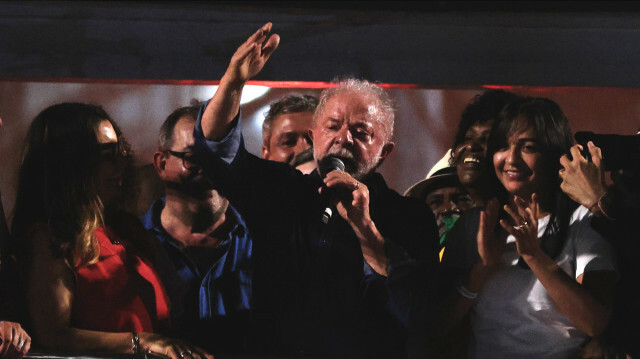
File photo
Lula remembered for lifting millions out of poverty amid left-wing Latin American movement marked by regional growth
Luiz Inacio Lula da Silva won Brazil's presidential election second-round runoff Sunday, beating far-right incumbent Jair Bolsonaro after a tense and highly polarized campaign race.
With nearly all the ballots counted, the man widely known as Lula garnered 50.9% or 60,345,421 votes, according to data from the Supreme Electoral Court. Bolsonaro received 49.1% or 57,976,538 votes.
Lula will become Brazil's 39th president on Jan. 1, 2023 after serving as the nation’s 35th president from 2003 to 2010.
A former union leader, Lula had been a candidate during the 2018 presidential election until a corruption and money laundering conviction curtailed his political aspirations. He was sent to prison and Bolsonaro, a former army captain, won the presidency.
In 2019, Lula was released from prison after his convictions were overturned by the Supreme Court, allowing him to run again for office.
Lula was born on Oct. 27, 1945 in Brazil's northeastern state of Pernambuco, where the seventh of eight children grew up in poverty.
During his early childhood, his farming parents relocated to Santos before settling in Brazil's financial capital, Sao Paulo, where Lula worked as a shoe shiner and a street vendor, never completing his studies.
He eventually worked as a metalworker and later gained recognition as a union leader -- famously organizing large-scale strikes against the ruling military dictatorship that governed Brazil from 1964-1985
Lula then entered the world of politics, founding the leftist Workers' Party (PT) in 1980.
As he continued his political ascent, he was beaten in three presidential races before achieving success in October 2002, becoming Brazil's first working-class president.
During his time in office, Lula gained international praise for engaging with the world through Brazil's foreign policy and formed close ties with other regional left-wing leaders during the 'pink tide' era -- a period where many Latin American countries turned to the left.
His domestic policies such as the Bolsa Familia welfare program helped slash extreme poverty and drive economic opportunities. Through the welfare program, low-income families received a monthly stipend, provided that their children attend school and get health checks.
During Lula's tenure between 2003-2010, Brazil had low unemployment and illiteracy levels as a commodities boom helped push 20 million citizens out of poverty.
At this time of strong economic growth, Brazil's currency, the real, strengthened against the US dollar.
Also during Lula's time in office, the authorities strongly clamped down on deforestation in the Amazon.
However, Lula was strongly condemned by environmentalists after displacing 40,000 people for the construction of the Belo Monte hydroelectric dam in the northern state of Para. The construction dried swathes of the local Xingu River, impacting Indigenous and other local communities who relied on it for food.
In 2010, Lula left office with high approval ratings, but a prominent corruption scandal during his tenure means public opinion today regarding the leftist politician is divided.
With both chambers of the legislature now having a strong conservative presence, Lula will likely face challenges to his presidency.
#Luiz Inacio Lula da Silva
#Brazil
#Latin America

